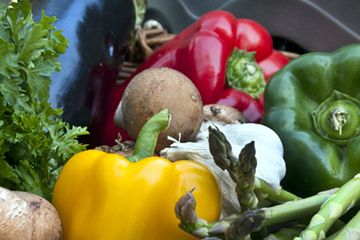Eating, Drinking Wisely Can Help Keep You Cool

(ISNS) -- Although the dog days of summer are numbered, the hot weather will last at least another month or two in most parts of the United States or maybe longer, so the question remains: what should you eat or drink to keep cool?
The U.S. is coming off what could be the hottest summer on record, and the scientific community is united in believing the warmest season will get warmer as the climate changes, so eating for the new normal is a serious issue, said Sara Risch, a food industry consultant, speaking to a news conference Tuesday, Aug. 21, at the annual meeting of the American Chemical Society in Philadelphia.
Risch said she was impressed by how little scientific research has been done on the subject, and most of what exists was done by the U.S. Department of Defense studying the military in hot climates.
The issue is mired in folklore and some of it is wrong.
How do you lower your body's thermostat the inexpensive, low-tech way? Keeping hydrated with fruits and vegetables that contain water, consuming the right minerals and the least amount of fat and proteins seemed to be the answer. Spicy food helps, as does astringent food and wines, the kind that make your mouth pucker. Having a cold beer may help, or maybe not.
"Most fruits and vegetables are nothing but water containers," said Shirley Corriher, a biochemist and author of several cooking books, also speaking at the press conference. Celery, for instance, is "fabulously water-packed," she said. So is watermelon.
Whole grains contain useful minerals such as magnesium and calcium, the same elements also found in sports drinks, which are particularly useful in preventing cramps if you exercise.
Sign up for the Live Science daily newsletter now
Get the world’s most fascinating discoveries delivered straight to your inbox.
Corriher also said cucumbers are particularly good in hot climates and recommended cucumber sandwiches on whole wheat with a slab of mayonnaise and sea salt on top as a hot-weather lunch.
Spicy foods also work, the reason people who live in tropical climates typically have a spicy cuisine. The spiciness, caused by compounds called capsaicin, makes you sweat.
"Perspiration is actually good for you," Risch said. "It comes to the surface of the skin, and you get evaporative cooling."
Ginger has the same effect, she said.
Astringent food also helps, and that includes beer and wines in moderation. The astringency dries out the cells they come in contact with so they will absorb more water.
Beer contains grains that can provide astringency, Risch said. Wine, especially red wine, contains astringent compounds called tannins, Corriher said. Even hot tea and coffees work can cool you down.
"Alcoholic beverages in moderation can be good, can be enjoyed," Corriher said.
Plain room-temperature water is best. "Any safe water is good to drink," Risch said.
Iced water or other iced drinks do not help, Risch said. They cool that part of the body in contact with the cold but the rest of the body then kicks in, shutting off some functions to warm the cold parts up to body temperature, providing no relief from the heat. Cold beer does the same, making beer's benefits questionable.
The body works harder digesting protein and fat, Corriher said, so foods high in those substances should be avoided -- and that includes ice cream, which is high in both.
"It cools you when you eat it, but alas, it doesn't last," Corriher said.
The same is true of meat.
Cooling treats that are fruit-based are better, said Risch.
Neither Risch nor Corriher could comment on the effects of caffeinated drinks such as coffee as the science is confusing. Tea works because of the tannin.
Risch, whose consulting company Science By Design works with food companies, said that the same companies that can produce protein or energy bars ought to be able to produce a "cool bar," an "everyday food people can eat."
"It may be a whole new category of health food," Risch said.
"Don't take heat lightly," Corriher said. "Don't be heroic and sit outside in the real sweltering heat at a restaurant."
Joel Shurkin is a freelance writer based in Baltimore. He is the author of nine books on science and the history of science, and has taught science journalism at Stanford University, UC Santa Cruz and the University of Alaska Fairbanks.
Inside Science News Service is supported by the American Institute of Physics.












